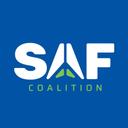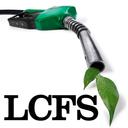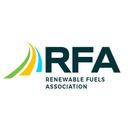Will the European Union continue to bet on only one method of reducing emissions from road transport, or will it adopt a more common-sense, hybrid approach?
In August, the U.S. Grains Council and the American Institute in Taiwan jointly organized a conference on the use applications and sustainability benefits of ethanol in the transportation sector.
Blue Biofuels Inc. has been awarded a $1.15 million Phase 2 Small Business Innovation Research grant from the U.S. Department of Energy. The funding will support the final stages of scaling the company’s patented cellulose-to-sugar (CTS) process.
The SAF Coalition submits comments on energy credits and incentives to House Ways and Means Committee
The Sustainable Aviation Fuel (SAF) Coalition submitted comments in response to requests for stakeholder comments on energy credits and incentives from the Supply Chain Tax Team of the U.S. House of Representatives’ Committee on Ways and Means.
The U.S. DOE has awarded Small Business Innovation Research and Small Business Technology Transfer Phase II funding to six bioenergy projects, including those focused on low-carbon liquid biofuels for aviation, marine and rail transportation.
The U.S. Department of Energy Bioenergy Technologies Office (BETO) is overseeing a call for industry partnerships to connect industry stakeholders with the capabilities of the Feedstock-Conversion Interface Consortium.
USGC connects Philippines government officials to US ethanol industry following voluntary E20 decree
In June, the Philippines began allowing fuel retailers to blend gasoline with up to 20% ethanol. The USGC is working to strengthen ties between the U.S. ethanol industry and the Philippines in anticipation of increased demand.
Growth Energy on Aug. 27 submitted new comments to CARB criticizing the board’s latest updates to California’s LCFS for unfairly singling out American biofuels in a way that will make it hard for them to generate credits under the program.
The Renewable Fuels Association on Aug. 27 called on California to allow the lower-cost, lower-carbon E15 fuel blend, containing 15 percent ethanol, as part of its efforts to enhance the state’s Low Carbon Fuel Standard.
The government of Brazil on Aug. 22 announced it will offer R$6 billion ($1.09 billion) to support the development of biorefineries to produce sustainable aviation fuel (SAF) and sustainable marine fuels.
Sens. Sherrod Brown, D-Ohio, and Pete Ricketts, R-Neb., in August introduced the Renewable Chemicals Act, a bill that aims to create a tax credit to support the production of biobased chemicals.
The RFA, Growth Energy and the USGC are among nearly three dozen U.S. agricultural and biofuel groups that sent a letter to Canadian Prime Minister Justin Trudeau on Aug. 19 urging him take action to ensure continued rail operations.
The Canadian government on Aug. 19 announced it will award up to C$6.59 million to Bioindustrial Innovation Canada to support the development of technologies to produce bioenergy, biofuels and biomaterials.
In comments submitted on Aug. 16 to the Surface Transportation Board, the Renewable Fuels Association stressed the importance of consistent, safe, and timely rail transportation to the ethanol industry and its customers. The
Growth Energy is urging the White House to swiftly finalize clear, flexible guidance for the 45Z clean fuels credit, which was signed into law two years ago this week. The credit takes effect in 2025.
The USDA on Aug. 16 awarded $90.3 million in Higher Blends Infrastructure Incentive Program grants to 89 projects in 26 states. The investments will help business owners install and upgrade fueling infrastructure.
The Federal Aviation Administration on Aug. 16 awarded $244.5 million to 22 projects that produce, transport, blend or store sustainable aviation fuel (SAF) and for scoping studies related to SAF infrastructure needs.
The U.S. EPA on Aug. 15 released updated SRE data, reporting that two new SRE petitions were filed under the RFS during the past month. A total of 48 SRE petitions are now pending, up from 46 that were pending as of mid-July.
The American Coalition for Ethanol 37th annual conference kicked off in Omaha on Aug. 15 with remarks from U.S. Department of Agriculture Secretary Tom Vilsack, as well as updates from the organization’s leadership.
The California Air Resources Board on Aug. 12 published a notice outlining modifications to its proposed LCFS amendments, including those related annual carbon intensity (CI) targets, biomass-based diesel feedstocks, and SAF.
The Surface Transportation Board is seeking nominees to fill five vacancies on its Rail Energy Transportation Advisory Committee. One vacancy is to be filled by a biofuel producer or feedstock grower.
The 2024 North American SAF Conference & Expo will consist of panels that describe the newest developments in the SAF Industry. Topics such as biofuel crops, federal policies, the increase of SAF usage worldwide, and more will be presented.
Experts in the fields of biomass and agricultural economics are setting the record straight on the environmental benefits of biofuels and the Renewable Fuel Standard.
Reps. Mike Flood, R-Neb., and Troy A Carter, Sr., D-La., on Aug. 9 introduced the Sustainable Aviation Fuel (SAF) Information Act. The bill directs the U.S. Energy Information Administration to include SAF data in its weekly and monthly reports.
Lifecycle assessment (LCA) is a rigorous, scientific and equitable method for evaluating carbon emissions across the entire value chain that is embedded in both the Canadian Clean Fuel Regulations and the U.S. Inflation Reduction Act.
Report predicts up to $6 in benefits for US economy for every $1 of federal SAF incentives at Gevo facility
Gevo Inc. on Aug. 9 released a new report by Charles River Associates demonstrating the benefits of sustainable aviation fuel (SAF) production, including at Gevo’s planned Net-Zero 1 (NZ1) alcohol-to-jet (ATJ) SAF facility in South Dakota.
The National Renewable Energy Laboratory, in partnership with the U.S. Department of Energy Bioenergy Technologies Office, released the first two parts of the Sustainable Aviation Fuel (SAF) State-of-Industry Report.
Sens. Sherrod Brown, D-Ohio, and Roger Marshall, R-Kan., and 13 of their colleagues are urging Treasury Secretary Janet Yellen to restrict the 45Z Clean Fuel Production Credit to fuels made from domestic feedstocks.
The Surface Transportation Board on July 15 announced that it will hold an in-person public hearing on Sept. 16 and 17, 2024, to gather information about recent trends and strategies for growth in the freight rail industry.
Growth Energy on July 31 filed a notice of intent to sue the U.S. EPA regarding the agency’s anticipated failure to meet its statutory deadline for issuing the 2026 Renewable Volume Obligation under the Renewable Fuel Standard.
Advertisement



























